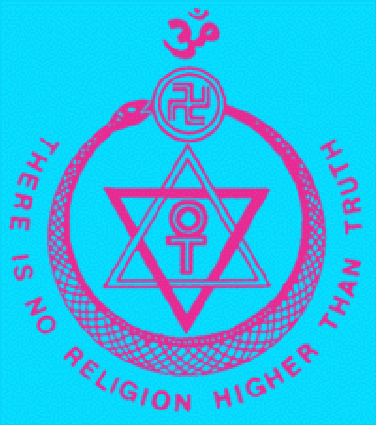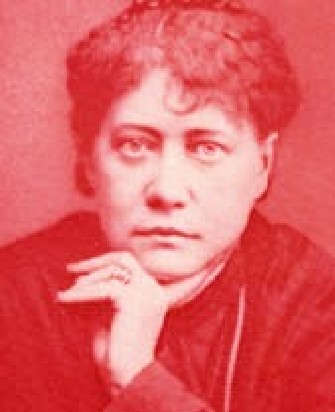H P Blavatsky’ View on Specific
Aspects of Esoteric Philosophy

Theosophy House
206 Newport Road, Cardiff, Wales, UK. CF24
-1DL
____________________________
Cardiff Theosophical Society
Mission Statement
The dominant and core activity of Cardiff Theosophical
Society
is to promote and assist the study of Theosophical
Teachings
as defined by the writings of Helena
Petrovna Blavatsky,
William Quan Judge, Alfred Percy Sinnett and their lineage.
This Mission Statement does not preclude non
Theosophical
activities but these must be of a spiritual nature
and/or compatible with the Objects of the Society.
____________________________

Helena Petrovna
Blavatsky (1831 – 1891)
The Founder of
Modern Theosophy
H P Blavatsky’s View On
Porphyry aka Porphyrius
A Neo-Platonist and a most distinguished writer, only second to Plotinus
as a teacher and philosopher. He was born before the middle of the third
century A.D., at
supposed to have belonged to a Jewish family. Though himself thoroughly
Hellenized and a Pagan, his name Melek (a king) does seem to indicate
that he had Semitic blood in his veins. Modern critics very justly consider him
the most practically philosophical, and the soberest, of all the
Neo-Platonists. A distinguished writer, he was specially famous for his
controversy with Iamblichus regarding the evils attendant upon the practice of
Theurgy. He was, however, finally converted to the views of his opponent. A
natural-born mystic, he followed, as did his master Plotinus, the pure Indian
Râj-Yoga training, which leads to the union of the Soul with the Over-Soul or
Higher Self (Buddhi-Manas). He complains, however, that, all his efforts
notwithstanding, he
did not reach this state of ecstacy before he was sixty, while Plotinus
was a proficient in it. This was so, probably because while his teacher held
physical life and body in the greatest contempt, limiting philosophical
research to those regions where life and thought become eternal and divine,
Porphyry devoted his whole time to considerations of the hearing of philosophy on
practical life. “The end of philosophy is with him morality”, says a
biographer, “we might almost say, holiness—the healing of man’s infirmities,
the imparting to him a purer and more vigorous life. Mere knowledge, however
true, is not of itself sufficient ; knowledge has for its object life in
accordance with Nous”—“reason”, translates the biographer. As we interpret
Nous, however, not as
Reason, but mind (Manas) or the divine eternal Ego in man, we would
translate the idea esoterically, and make it read “the occult or secret
knowledge has for its object terrestrial life in accordance with Nous, or our
everlasting reincarnating Ego”, which would be more consonant with Porphyry’s
idea, as it is with esoteric philosophy. (See Porphyry’s De Abstinentia ., 29.)
Of all the Neo-Platonists, Porphyry approached the nearest to real
Theosophy as now taught by the Eastern secret school. This is shown by all our
modern critics and writers on the Alexandrian school, for “he held that the
Soul should be as far as possible freed from the bonds of matter, . . . be
ready . . . to cut off the whole body”. (Ad Marcellam, 34.) He recommends the
practice of abstinence, saying that “we should be like the gods if we could
abstain from vegetable as well as animal food”. He accepts with reluctance
theurgy and mystic incantation
as those are “powerless to purify the noëtic (manasic) principle of the
soul”: theurgy can “but cleanse the lower or psychic portion, and make it
capable of perceiving lower beings, such as spirits, angels and gods” (Aug. De
Civ. Dei. X., 9), just as Theosophy teaches. “Do not defile the divinity”, he
adds, with the vain imaginings of men you will not injure that which is for
ever blessed (Buddhi-Manas) but you will blind yourself to the perception of
the greatest and most vital truths”. (Ad Marcellam,18.) “If we would he free
from the assaults of evil spirits, we must keep ourselves clear of those things
over which evil
spirits have power, for they attack not the pure soul which has no
affinity with them”. (De Abstin. ii., 43.) This is again our teaching.
The Church Fathers held Porphyry as the bitterest enemy, the most
irreconcilable to Christianity. Finally, and once more as in modern Theosophy,
Porphyry—as all the Neo-Platonists, according to
wisest of men”. (De Civ. Dei., X1X., 23.) Yet, “even in the storm of
controversy, scarcely a word seems to have been uttered against the
private life of Porphyry. His system prescribed purity and . . . he practised
it”. (See A Dict. of Christian Biography, Vol. IV., “Porphyry”.)
From H P Blavatsky’s Theosophical Glossary Published 1892
______________________

Cardiff Theosophical Society in
Theosophy House
206 Newport Road, Cardiff, Wales, UK. CF24
-1DL
Find out more about
Theosophy with these links

The Cardiff Theosophical Society Website
The
National Wales Theosophy Website
If you run a Theosophy Group, please feel free
to use any of the material on this site
The Most Basic Theosophy
Website in the Universe
A quick overview of Theosophy
and the Theosophical Society
If you run a Theosophy Group you
can use this as an introductory handout.
Theosophy Cardiff’s Instant Guide
One liners and quick explanations
H P Blavatsky is
usually the only
Theosophist that
most people have ever
heard of. Let’s
put that right
The Voice of the Silence Website
An Independent Theosophical Republic
Links to Free Online Theosophy
Study Resources; Courses, Writings,
The main criteria
for the inclusion of
links on this
site is that they have some
relationship
(however tenuous) to Theosophy
and are
lightweight, amusing or entertaining.
Topics include
Quantum Theory and Socks,
Dick Dastardly and Legendary Blues Singers.
A selection of articles
on Reincarnation
Provided in
response to the large
number of
enquiries we receive at
Cardiff
Theosophical Society on this subject
The Voice of the Silence Website
This is for
everyone, you don’t have to live
in Wales to make
good use of this Website
No
Aardvarks were harmed in the
The Spiritual Home of Urban Theosophy
The Earth Base for Evolutionary Theosophy
A B C D EFG H IJ KL M N OP QR S T UV WXYZ
Complete Theosophical Glossary in Plain Text Format
1.22MB
________________
Preface
Theosophy and the Masters General Principles
The Earth Chain Body and Astral Body Kama – Desire
Manas Of Reincarnation Reincarnation Continued
Karma Kama Loka
Devachan
Cycles
Arguments Supporting Reincarnation
Differentiation Of Species Missing Links
Psychic Laws, Forces, and Phenomena
Psychic Phenomena and Spiritualism
Quick Explanations with Links to More Detailed Info
What is Theosophy ? Theosophy Defined (More Detail)
Three Fundamental Propositions Key Concepts of Theosophy
Cosmogenesis Anthropogenesis Root Races
Ascended Masters After Death States
The Seven Principles of Man Karma
Reincarnation Helena Petrovna Blavatsky
Colonel Henry Steel Olcott William Quan Judge
The Start of the Theosophical
Society
History of the Theosophical
Society
Theosophical Society Presidents
History of the Theosophical
Society in Wales
The Three Objectives of the
Theosophical Society
Explanation of the Theosophical
Society Emblem
The Theosophical Order of
Service (TOS)
Glossaries of Theosophical Terms
Index of Searchable
Full Text Versions of
Definitive
Theosophical Works
H P Blavatsky’s Secret Doctrine
Isis Unveiled by H P Blavatsky
H P Blavatsky’s Esoteric Glossary
Mahatma Letters to A P Sinnett 1 - 25
A Modern Revival of Ancient Wisdom
(Selection of Articles by H P Blavatsky)
The Secret Doctrine – Volume 3
A compilation of H P Blavatsky’s
writings published after her death
Esoteric Christianity or the Lesser Mysteries
The Early Teachings of The Masters
A Collection of Fugitive Fragments
Fundamentals of the Esoteric Philosophy
Mystical,
Philosophical, Theosophical, Historical
and Scientific
Essays Selected from "The Theosophist"
Edited by George Robert Stow Mead
From Talks on the Path of Occultism - Vol. II
In the Twilight”
Series of Articles
The In the
Twilight” series appeared during
1898 in The
Theosophical Review and
from 1909-1913 in The Theosophist.
compiled from
information supplied by
her relatives and friends and edited by A P Sinnett
Letters and
Talks on Theosophy and the Theosophical Life
Obras Teosoficas En Espanol
Theosophische Schriften Auf Deutsch
An Outstanding
Introduction to Theosophy
By a student of
Katherine Tingley
Elementary Theosophy Who is the Man? Body and Soul
Body, Soul and Spirit Reincarnation Karma
Try these if you are looking for a local
Theosophy Group or Centre
UK Listing of Theosophical Groups
All Wales
Guide to Theosophy Instant
Guide to Theosophy
Theosophy
Wales Hornet Theosophy
Wales Now
Cardiff
Theosophical Archive Elementary Theosophy
Basic
Theosophy Theosophy in
Cardiff Theosophy
in Wales
Hey Look!
Theosophy in Cardiff Streetwise
Theosophy
Grand
Tour Theosophy
Aardvark Theosophy Starts Here
Theosophy206
Theosophy Introduction
Theosophy Cardiff’s Face Book of Great Theosophists
Theosophy Evolution Theosophy Generally Stated
Biography of Helena Petrovna Blavatsky
____________________________
Cardiff Theosophical Society
Mission Statement
The dominant and core activity of Cardiff Theosophical
Society
is to promote and assist the study of Theosophical
Teachings
as defined by the writings of Helena
Petrovna Blavatsky,
William Quan Judge, Alfred Percy Sinnett and their lineage.
This Mission Statement does not preclude non
Theosophical
activities but these must be of a spiritual nature
and/or compatible with the Objects of the Society.
____________________________
Cardiff Theosophical Society in
Theosophy House
206 Newport Road, Cardiff, Wales, UK. CF24
-1DL